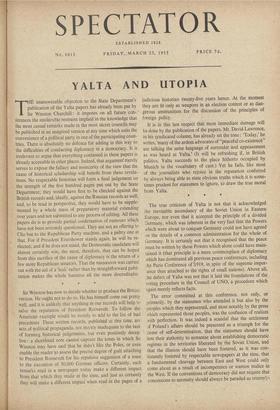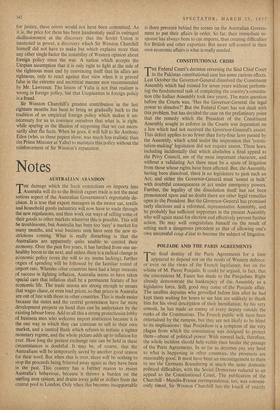YALTA AND UTOPIA
THE unanswerable objection to the State Department's publication of the Yalta papers has already been put by Sir Winston Churchill : it imposes on all future con- ' ierences the intolerable restraint implied in the knowledge that the most casual remarks made in the most secret councils may be published in an unagreed version at any time which suits the convenience of a political party in one of the participating coun- tries. There is absolutely no defence for adding in this way to the difficulties of conducting diplomacy in a democracy. It is irrelevant to argue that everything contained in these papers is already accessible in other places. Indeed, that argument merely serves to expose the fallacy and insincerity of the view that the cause of historical scholarship will benefit from these reVela- tions. No respectable historian will form a final judgement on the strength of the five hundred pages put out by the State Department; they would have first to be checked against the British records and, ideally, against the Russian records as well, and, to be read in perspective, they would have to be supple- mented by a whole mass of preparatory material extending over years and not submitted to any process of editing. All these papers do is to provide partial confirmation of rumours which have not been seriously questioned. They are not an offering to Clio but to the Republican Party machine, and a paltry one at that. For if President Eisenhower stands again, he will be re- elected; and if he does not stand, the Democratic candidate will almost certainly win; the most, therefore, that can be hoped from this sacrifice of the cause of diplomacy is the return of a few more Republican senators. That the manceuvre was carried out with the aid of a 'leak' rather than by straightforward publl cation makes the whole business all the more discreditable Sir Winston has now to decide whether to produce the British version. He ought not to do so. He has himself come out pretty well, and it is unlikely that anything in our records will help to salve the reputation of President Roosevelt. To follow the American example would be merely to add to the list of bad precedents These written records, published at this time, are acts of 'political propaganda, not merely inadequate to the task of forming historical judgements, but even positively decep- tive: a shorthand note cannot capture the tones in which Sif Winston may have said' that he didn't like the Poles, or even enable the reader to assess the precise degree of guilt attaching to President Roosevelt for his repulsive suggestion of a toast to the execution of 50,000 German officers. Certainly, such remarks read in a newspaper today make a different impact from that which they made at the time, and just as certainly they will make a different impad when read in the pages of a judicious historian twenty-five years hence. At the moment they are fit only as weapons in an election contest or as dan- gerous ammunition for the discussion of the principles of fcrreign policy.
It is in this last respect that most immediate damage will be done by the publication of the papers. Mr. David Lawrence, in his syndicated column, has already set the tone: 'Today,' he writes, 'many of the ardent advocates of "peaceful co-existence" are talking the same language of surrender and appeasement as was heard at Yalta.' (It will be refreshing if, in British politics, Yalta succeeds to the place hitherto occupied by Munich in the vocabulary of cant.) Yet he fails, like most of the journalists who rejoice in the reputation conferred by always being able to state obvious truths which it is some- times prudent for statesmen to ignore, to draw the true moral from Yalta.
The true criticism of Yalta is not that it acknowledged the inevitable ascendancy' of the Soviet Union in Eastern Europe, nor even that it accepted the principle of a divided Germany, which was inherent in the very fact that the Powers which were about to conquer Germany could not have agreed on the details of a common administration for the whole of Germany. It is certainly not that it recognised that the peace must be written by those Powers which alone could have main- tained it (that principle is a mere commonplace of diplomacy which has dominated all previous peace conferences, including he Paris Conference of 1919, in spite of the supreme impor- .ance then attached to the rights of small nations). Above all, :he defect of Yalta was not that it laid the foundations of the voting procedure in the Council of UNO, a procedure which again merely reflects facts.
The error committed at this conference, not only, or primarily, by the statesmen who attended, it but also by the peoples which they represented, and most notably by the press ,vhich represented those peoples, was the confusion of realism with perfection. It was indeed a scandal that the settlement 1 Poland's affairs should be presented as a triumph for the cause of self-determination, that the statesmen should have lent their authority to nonsense about establishing democratic regimes in the territories liberated by the Soviet Union, and that the illusion should have been fostered, as it was con- sistently fostered by respectable newspapers at the time, that a fundamental cleavage between East and West could only come about as a result of incompetence or wanton malice in the West. If the conventions of democracy did not require that concessions to necessity should always be paraded as triumOs
for justice, these errors would not have been committed. As it is, the price for them has been handsomely paid in outraged disillusionment at the discovery that the Soviet Union is interested in power, a discovery which Sir Winston Churchill himself did not have to make but which explains more than any other single factor the instability of Western opinion about foreign policy since the war. A nation which accepts the Utopian assumption that it is only right to fight at the side of the righteous must end by convincing itself that its allies are righteous, only to react against that view when it is proved false in the extreme and uncritical manner now recommended by Mr. Lawrence. The lesson of Yalta is not that realism is wrong in foreign policy, but that Utopianism in foreign poliey is a fraud.
Sir Winston Churchill's greatest contribution in the last eighteen months has been to bring us gradually back to the tradition of an empirical foreign policy which makes it un- necessary for us to convince ourselves that what is, is right, while spaying us the illusion of supposing that we can neces- sarily alter ihe facts. When he goes, it will fall to Sir Anthony Eden (who, as these papers show, was much less realistic than the Prime Minister at Yalta) to maintain this policy without the reinforcement of Sir Winston's reputation.



































 Previous page
Previous page